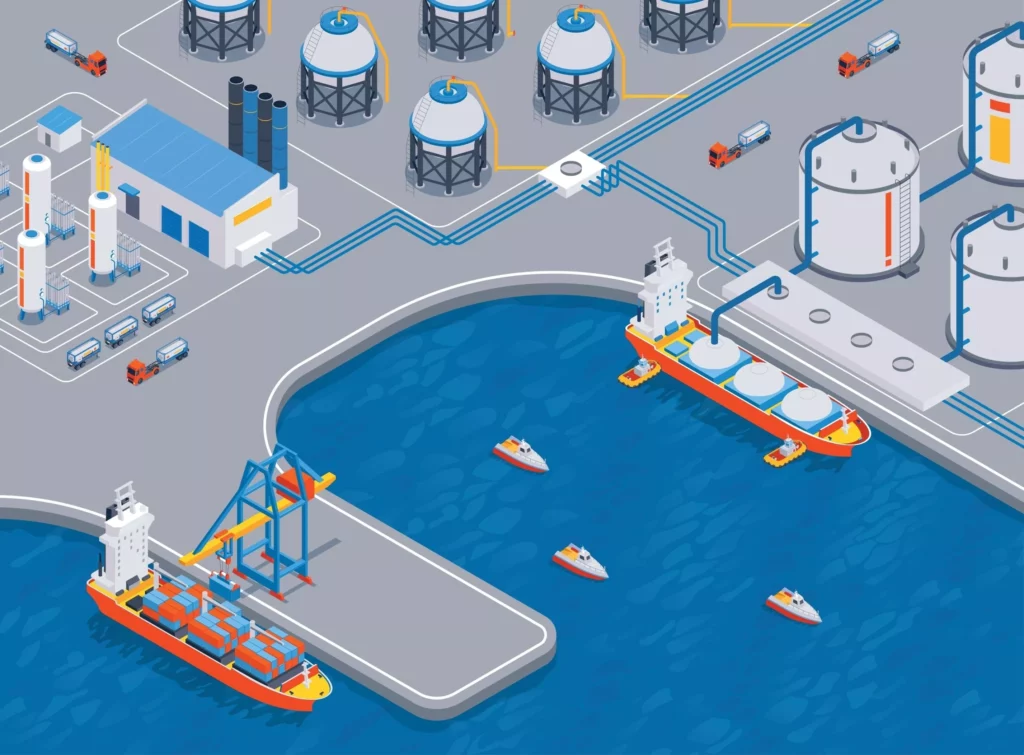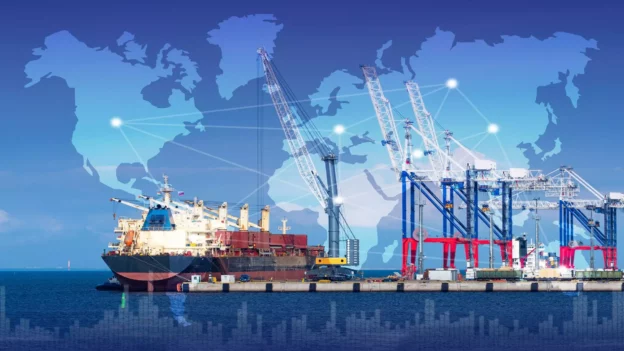Table of Contents
- What is the maritime value chain?
- Influence of maritime terminals in the value chain
- What is the importance of maritime terminals in the global value chain?
- Logistics in port operations: A pillar of efficiency in the maritime value chain
- Impact of maritime trade on the global economy
- Port economy: Driver of regional and global development
- Maritime terminal security
- Conclusions
- References
Maritime terminals are precise links within the global value chain. They facilitate international trade and enhance supply chain efficiency by connecting a complex network of key stakeholders, thereby driving global economic development. These facilities adeptly manage the logistical processes involving these activities and ensure a seamless and effective transition between maritime trade and the global economy. This role highlights the pivotal influence of maritime terminals in the value chain.
Furthermore, operations at these port facilities, which include the loading and unloading of vessels, the management of goods in transit, and the provision of logistical and operational services, are crucial for ensuring the efficient flow of goods and products on a global scale. With the adoption of modern technologies that automate processes associated with maritime trade, port operations have become more efficient and sustainable.
In this article, we will explore the functioning of maritime terminals in the global hydrocarbons value chain and their impact on the global economy.
What is the maritime value chain?
The maritime value chain encompasses a broad spectrum of critical processes and activities within the shipping industry, defined as an extensive network of interconnected systems that facilitate intercontinental trade. This network ranges from the coordination of activities and services, such as cargo movement and logistic management, to collaboration among various entities, including shipping organizations, port authorities, and import-export companies.
From initial logistical planning and cargo consolidation to maritime transportation and the final delivery of goods, the maritime value chain integrates sea and land transportation, creating a continuous flow that optimizes the efficiency and sustainability of global operations.
In response to increasing demands for environmental protection and efficient resource management, the maritime value chain is evolving towards more sustainable practices, adapting its operations to minimize environmental impact and enhance energy efficiency. This adaptation not only meets environmental needs but also strengthens the strategic position of maritime terminals in the global economy.
Influence of maritime terminals in the value chain
Today, maritime terminals have grown into imposing structures due to the intense logistical activity driven by the growth of global maritime trade. This expansion includes various types of terminals, such as those for liquid bulks, solid bulks, containers, and multipurpose operations, each holding significant industrial importance. These facilities are equipped with the necessary capacity to handle and store cargo originating from numerous countries, thus optimizing maritime logistics and distribution.
Within the maritime value chain, terminals connect maritime carriers, logistics operators, consignees, and customs authorities, among other stakeholders in international maritime trade. They handle the reception, storage, and preparation of cargo for subsequent transportation, whether by land or air, ensuring the integrity and security of the goods throughout the process.
Maritime terminals enhance the efficiency and reliability of global trade, playing a crucial role in the economic dynamics of trading nations. Their strategic management and operation significantly impact everything from local economies to global market trends.
What is the importance of maritime terminals in the global value chain?
In the value chain, maritime terminals are pivotal for the optimization of international trade and global maritime logistics and distribution. Their contribution to economic growth is significant as they facilitate trade between nations, generate a substantial amount of employment, and enhance supply chain management through advanced services in storage, consolidation, and redistribution of cargo.
These terminals integrate advanced technologies such as automation, real-time data analytics, and blockchain to improve transparency, security, and efficiency in logistics operations. Terminals also implement sustainable practices, reducing emissions and managing waste, and ensure safety through stringent measures to protect cargo, crew, and facilities from various risks.
As gateways for international trade, they directly influence the competitiveness of economies. Their effectiveness in handling large volumes of cargo determines the speed and efficiency with which goods are transported across borders, highlighting their role in the global economy.

Logistics in port operations: A pillar of efficiency in the maritime value chain
Logistics in port operations are essential for the efficient handling of products and encompass everything from planning and management to the coordination of transport and cargo handling. The implementation of advanced technologies such as automated warehouse management systems, enterprise resource planning software, and the digitization of customs procedures enhance operational excellence and improve customer service, adapting to the dynamic needs of global trade.
In ports, logistical tasks extend beyond the reception and storage of goods; they include careful handling and preparation for subsequent transportation. Meticulous resource management ensures that operations are conducted safely and within appropriate times, which is crucial for keeping pace with the global supply chain.
Port logistics represent a major component in the global logistics chain, facilitating efficient cargo management and serving as checkpoints for the observance of trade and customs regulations; this ensures that goods comply with international regulations before their shipment or receipt, reinforcing the security and efficacy of international trade.
Efficient management in port logistics involves solutions for each procedure and operation. It optimizes the flow of goods through coordination among all participants involved in the process, including port authorities, shipping lines, and customs agents, among others. Integrated communication platforms enable real-time information sharing, improving the traceability of cargo.
Impact of maritime trade on the global economy
Maritime trade acts as the primary engine of international commerce and is geared towards sustainable development on a global scale. It is responsible for transporting more than 85% of all global merchandise; it is an extensive and dynamic system that facilitates the movement of goods from their point of origin to their final destination. This activity promotes economic growth and global connectivity. By fostering commercial exchanges, maritime trade creates links between distant markets, enabling producers and consumers from various parts of the world to interact efficiently and precisely.
The following video presents a collaborative initiative that is innovating the landscape of customs logistics, optimizing global maritime trade. The project, titled “Digitalization of Global Maritime Trade,” aims to strengthen customs processes in the interests of efficiency, sustainability, and global connectivity. Fuente: Maersk.

Project: Digitizing Global Maritime Trade. Digitization of customs processes.
Historically, maritime trade has been a driving force in the development of civilizations and economies. From the early vessels that traversed the seas to the modern, gigantic ships that transport unimaginable cargoes today, this sector has progressed in tandem with technological advancements and adaptations to increasingly stringent environmental regulations. This evolution reflects the sector’s ability to adapt to changing challenges and also underscores its role in shaping global trade over the centuries.
Port economy: Driver of regional and global development
Port economy encompasses the study of the economic impacts derived from activities and operations conducted at maritime terminals, as well as their influence on local, regional, and global economies. This discipline analyzes how ports, through their infrastructure and services, facilitate international trade and intermodal transportation, and how these factors contribute to economic growth.
A key concept in this field is that of port value-added, which encompasses the additional wealth generated by port activities in goods and services, including job creation, investments in infrastructure, and income related to transportation and logistics.
For example, the Port of Amsterdam stands out as one of the largest ports for gasoline and liquid bulk globally. Its strategic position on the Amsterdam-Rotterdam-Antwerp axis makes it a strategic point for fuel trade. Furthermore, its efforts in developing areas for sustainable fuel production near tank storage terminals demonstrate its commitment to innovation and sustainability, showcasing ports’ ability to influence the economy beyond logistical operations1.
Maritime terminal security
Security at maritime terminals is a significant aspect that goes beyond mere physical protection of cargoes. It involves the implementation of advanced risk management systems to ensure uninterrupted operations and minimize threats, both natural and human-made. From measures against sabotage to protocols for handling spills of hazardous substances, comprehensive security is necessary to maintain operability and reliability between maritime terminals and the global value chain.
In addition to physical protection, maritime terminal security also encompasses data protection and cybersecurity. With the increasing digitalization of port operations, ensuring the integrity of information and protecting it against cyberattacks is essential. Implementing secure networks, data encryption, and ongoing training of personnel in cybersecurity practices are essential measures to strengthen terminals against digital vulnerabilities.
Conclusions
Maritime terminals represent precise links in the global value chain. By facilitating international trade and optimizing the supply chain, these terminals connect a complex network of actors related to port operations, maritime transportation, maritime trade, logistics and maritime distribution.
The contribution of port terminals to global economic development is significant, as they facilitate the movement of goods across international borders and stimulate regional and global economic growth. Efficiency and security in the value chain ensure a smooth and effective flow of goods and products, underscoring their importance in the global economy.
References
1.- https://www.portofamsterdam.com/en/business/cargo-flows/liquid-bulk


